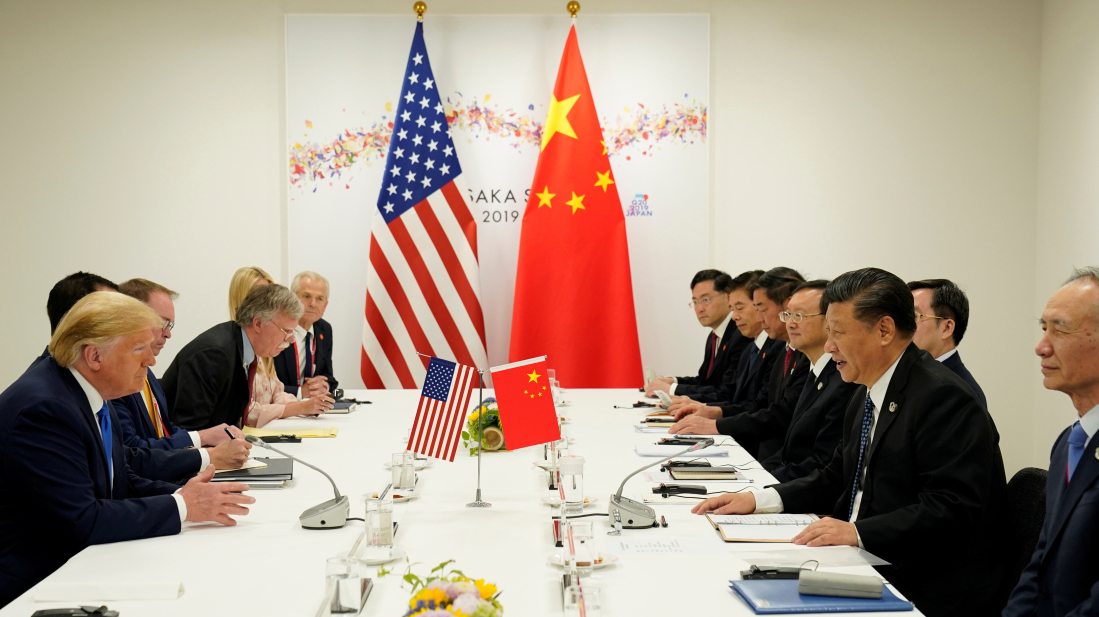Türkiye and Serbia agree to deepen defence, trade and foreign policy ties
Türkiye and Serbia agreed to expand cooperation across defence, foreign policy and economic relations following talks between President Recep Tayyip ...

U.S. President Donald Trump remains set to meet Chinese leader Xi Jinping in South Korea in late October as both sides seek to ease tensions over tariff threats and export controls, U.S. Treasury Secretary Scott Bessent said on Monday.
The latest rift followed China’s announcement on Thursday that it would significantly expand its rare earth export controls, prompting a sharp countermeasure from Trump on Friday that sent markets and relations between the world’s two largest economies into turmoil.
Bessent said there had been extensive communications between the two sides over the weekend and that more meetings were planned.
“We have substantially de-escalated,” Bessent told Fox Business Network.
“President Trump said that the tariffs would not take effect until 1 November. He will be meeting with Party Chair Xi in Korea. I believe that meeting will still go ahead.”
Trump and Xi are due to meet during the Asia-Pacific Economic Cooperation (APEC) summit, hosted by South Korea in late October.
China’s Commerce Ministry said on Tuesday it had informed the United States in advance of its decision to tighten rare earth controls, confirming that communication between the two countries continued and that a working-level meeting had taken place on Monday.
However, a ministry spokesperson warned that “the U.S. cannot ask for talks while simultaneously threatening new restrictive measures.”
Asian stocks saw a modest rebound in early trading on Tuesday after Wall Street’s main indexes closed up as much as 2.2% on Monday, following Bessent’s comments suggesting that trade negotiations between the two superpowers were still on track.
Trump’s tariff threat on Friday had triggered a major sell-off, coming at a time when investors and policymakers were already uneasy about an overheated stock market driven by an artificial intelligence investment boom that some officials fear could harm future employment.
Bessent said there would be U.S.-China staff-level meetings this week in Washington on the sidelines of the World Bank and International Monetary Fund annual gatherings.
“The 100% tariff does not have to happen,” Bessent said. “The relationship, despite last week’s announcement, is good. Lines of communication have reopened, so we’ll see where it goes.”
U.S. Pushback Aggressive
Even so, Bessent described China’s move as provocative and said Washington had responded forcefully.
The United States had been consulting with allies and expected backing from Europe, India, and democratic nations in Asia, he added.
“China is a command-and-control economy. They are neither going to command nor control us,” Bessent said.
China, for its part, blamed the United States for escalating trade tensions and called Trump’s latest threat of 100% tariffs on Chinese goods hypocritical. It defended its new curbs on the export of rare earth elements and equipment. China dominates the global market for these materials, which are vital to technology manufacturing.
Under the new Chinese regulations, foreign companies producing certain rare earths and related magnets must now obtain a Chinese export licence if the final product contains or is made with Chinese equipment or materials — even if no Chinese firms are directly involved in the transaction.
The United States would reject such licensing requirements, Bessent said in his interview on Mornings with Maria.
James Van Der Beek, who rose to fame as Dawson Leery in the hit teen drama Dawson’s Creek, has died aged 48 following a battle with stage 3 colorectal cancer.
Canadian Prime Minister Mark Carney said a bridge project linking Canada’s Ontario province with the U.S. state of Michigan would contribute to cooperation between the two countries.
U.S. President Donald Trump and Prime Minister of Israel Trump hosted Netanyahu for closed-door talks focused on negotiations with Tehran, Gaza and wider rBenjamin Netanyahu ended a two-and-a-half-hour meeting at The White House on Wednesday without reaching agreement on how to move forward on Iran.
Mexican Alpine skier Lasse Gaxiola will have his mother for company on his Olympic debut but she will not be cheering him from the finish area in Saturday's giant slalom in Bormio because she will be three hours away preparing her own race.
The suspect in a deadly school shooting in western Canada was an 18-year-old woman who allegedly killed her mother and stepbrother before attacking her former school. Investigators have not provided a motive for what is being described as one of the worst mass killings in Canada.
U.S. President Donald Trump said Israeli President Isaac Herzog is “disgraceful” for not granting a pardon to Prime Minister Benjamin Netanyahu, adding that he “should be ashamed of himself”.
Ukraine’s allies have pledged nearly $48bn in military support at a meeting of the Ukraine Defence Contact Group in Brussels, vowing to intensify pressure on Russia and strengthen Kyiv’s battlefield position.
Medical group accuses paramilitary force of targeting civilians in al-Kurqal area, urges international action to protect residents.
Day 6 of the Milano Cortina 2026 Winter Olympics brought fans and photographers unforgettable moments of athleticism, determination and sheer joy. From the ice rinks of Milan to the snowy slopes of Livigno, athletes pushed themselves to the limit delivering breathtaking performances.
U.S. border chief Tom Homan said on Thursday (12 February) a federal immigration crackdown in Minnesota will end after months of raids that led to more than 4,000 arrests, mass protests and two fatal shootings.
You can download the AnewZ application from Play Store and the App Store.

What is your opinion on this topic?
Leave the first comment